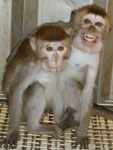Whole-genome sequencing and analysis of the Malaysian cynomolgus macaque
(Macaca fascicularis) genomeAtsunori Higashino, Ryuichi Sakate, Yosuke Kameoka, Ichiro Takahashi, Makoto Hirata, Reiko Tanuma, Tohru Masui, Yasuhiro Yasutomi and Naoki Osada Background
The genetic background of the cynomolgus macaque (Macaca
fascicularis) is made complex by the high genetic diversity, population structure, and gene introgression from the closely related rhesus macaque
(Macaca mulatta). Herein we report the whole-genome sequence of a Malaysian cynomolgus macaque male with more than 40-fold coverage, which was determined using a resequencing method based on the Indian rhesus macaque genome.
Results
We identified approximately 9.7 million single nucleotide variants (SNVs) between the Malaysian cynomolgus and the Indian rhesus macaque genomes. Compared with humans, a smaller nonsynonymous/synonymous SNV ratio in the cynomolgus macaque suggests more effective removal of slightly deleterious mutations. Comparison of two cynomolgus (Malaysian and Vietnamese) and two rhesus (Indian and Chinese) macaque genomes, including previously published macaque genomes, suggests that Indochinese cynomolgus macaques have been more affected by gene introgression from rhesus macaques. We further identified 60 nonsynonymous SNVs that completely differentiated the cynomolgus and rhesus macaque genomes, and that could be important candidate variants for determining species-specific responses to drugs and pathogens. The demographic inference using the genome sequence data revealed that Malaysian cynomolgus macaques have experienced at least three population bottlenecks.
Conclusions
This list of whole-genome SNVs will be useful for many future applications, such as an array-based genotyping system for macaque individuals. High-quality whole-genome sequencing of the cynomolgus macaque genome may aid studies on finding genetic differences that are responsible for phenotypic diversity in macaques and may help control genetic backgrounds among individuals. Genome Biology 2012, 13:R58 doi:10.1186/gb-2012-13-7-r58 
JUL/24/2012
Copyright(C) 2012 PRI ( ).
All rights reserved. ).
All rights reserved. | 



